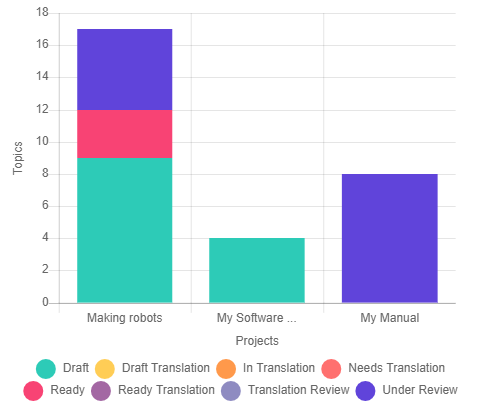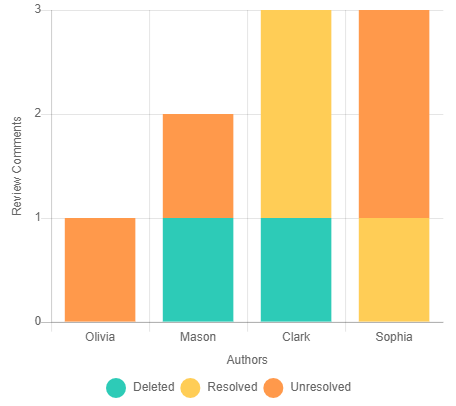
Effective teamwork is vital for the success of any project, and it is particularly important for technical writers since they have to collaborate closely with developers, subject matter experts, and others to produce high-quality documentation. The combined efforts of the whole team help them see the big picture and achieve results that far surpasses almost anything they could achieve alone.
Yet, to manage any team, you need to monitor its performance. Without the proper metrics and oversight, it is difficult to accurately gauge how well the team is functioning and identify areas for improvement. Key performance indicators help team leads and managers make data-driven decisions to optimize processes, allocate resources efficiently and motivate high performance.
Typical Metrics and Approaches to Evaluate Your Team Performance
Before we start evaluating and managing how effectively the technical writer collaborates with the team, let’s take a look at some common metrics first.
The most obvious and straightforward metric of success is whether the team achieved the initial goal or not and how they met deadlines and budget. For this metric to be objective, the goal should be clear, measurable, and time-bound. This way, it would be much easier to evaluate the team’s performance and reflect on what helped or hindered their success.
Then you should look at the result itself. Is it good? Does it have any defects? Is the end user of your product satisfied?
The next one is productivity: how much work did the team complete in a certain period? It can be measured quantitatively based on issues resolved, tasks finished, etc. So, don’t forget to define such performance indicators at the beginning of the project. It is also possible to measure the overall efficiency here by considering such factors as time and resources spent on the project.
Another important metric, last but not least, is the atmosphere in the team. Ask the team members for feedback or conduct a team survey to find out if the team members are able to work as a cohesive unit, are satisfied and motivated in their work, and collaborate well.
What Makes Technical Writers’ Teamwork Different?
Let’s take a closer look at the team that involves technical writers, among other specialists, such as QA, developers, marketing, etc. How to measure the effectiveness of such a team consisting of specialists in so many different fields?
Well, let’s note that no matter the differences, all of them share the same goal — high-quality documentation. With that in mind, it’s much easier to look at the processes of organizing and evaluating teamwork.
We’d recommend you try the topic-based approach. What makes it especially suitable for technical documentation is that this approach is based on dividing content into small blocks of information short enough to be specific to a certain single subject — topics. These topics can be mixed and reused in different contexts, and the user could read them in any order or skip around to different topics, as needed.
And for the team, breaking topics into stages gives a more clear picture of the work processes.
You may already see that the topic-based approach is also quite useful for evaluating teamwork efficiency since it allows you to highlight a few solid metrics to evaluate your team’s workflow.
Depending on your team lineup, you may include the following in the team performance appraisal process:
- How many topics are complete?
- How many are not started yet?
- How many are in the writing stage?
- How many are in the developer review stage?
- How many are in the QA testing stage?
Different tools let you easily monitor all of the above and more. Here’s an example of tracking workflow in ClickHelp:

You can see that it is very clear and intuitive. Additional reports show you who is working on what and help you find and neutralize potential bottlenecks. For example, you can see that Sophia here might be a bit overwhelmed. In terms of better team performance, it might be better to reduce the load on her and reassign some of her tasks to another reviewer.

More than that, in ClickHelp, it is possible to go beyond the pre-made patterns and create your own set of workflow statuses and allowed transitions to see the real processes of your team. To learn more, check our knowledge base on the topic of Workflow and Review or book a live ClickHelp demo where our specialists will answer your questions.
Tips for Effective Teamwork
In addition to using the topic-based approach and help-authoring tools, try to implement these tips to make your workflow smooth and effective.
- Clearly define team roles and responsibilities, and avoid overlap and gaps.
- Establish clear communication channels, set strict expectations for communication frequency, and establish a rhythm for status updates, issues reports, and reviews.
- Keep track of individual and team progress.
- Focus on the end goal, not just individual tasks, but recognize each team member’s contribution and share credit for the team’s work.
- Handle setbacks constructively as opportunities for improvement.
During reviews, remember to include all relevant team members to collect feedback from different perspectives and discuss improvements that would benefit the end product.
Overall, maintain a team-first attitude and focus on collaborating, but don’t forget to be flexible and have fun from time to time.

Conclusion
When all the necessary ingredients are in place, the team is able to collaborate smoothly and efficiently to create high-quality documentation. The final result reflects not just the work of individuals but a true synthesis of multiple perspectives, skills, and areas of expertise.
Measuring and monitoring team performance through the use of meaningful metrics is crucial for managers to effectively develop, coach, and guide their teams toward achieving excellence. The right performance indicators, insightfully analyzed and constructively acted upon, can make a big difference in a technical writing team’s success.
Good luck with your technical writing!
ClickHelp Team
Author, host and deliver documentation across platforms and devices